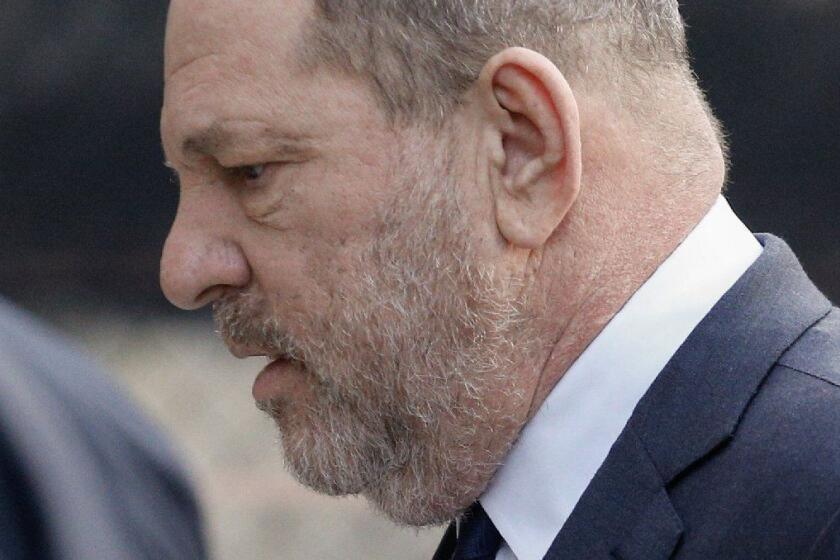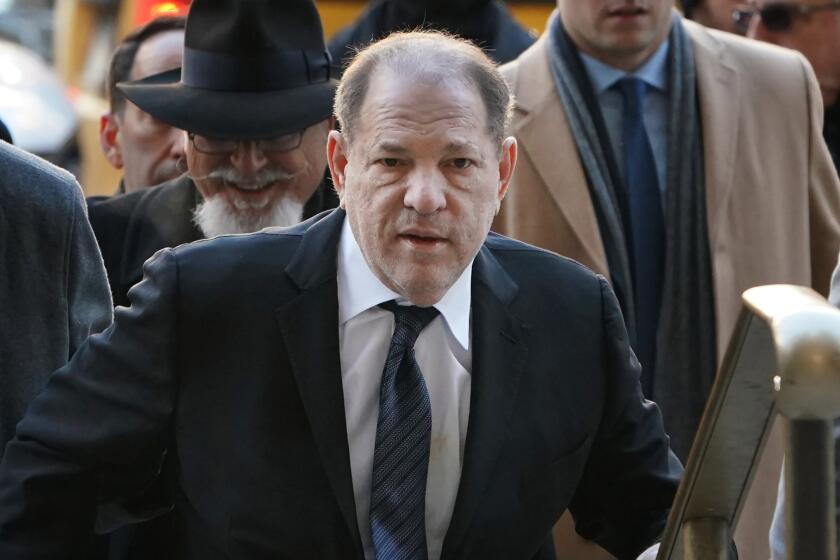Harvey Weinstein granted appeal in New York rape, sex crime conviction

- Share via
Harvey Weinstein’s 2020 sex crimes conviction, which put him behind bars for nearly a quarter-century, will be reviewed by the full New York Court of Appeals after its chief judge decided there was a question of law that needed to be addressed by the panel.
Chief Judge Janet DiFiore granted the request for an appeal in the Hollywood mogul’s 2020 case, in which he was found guilty of rape and a felony sex crime.
Weinstein’s legal team had appealed his rape conviction in April 2021, arguing his constitutional rights were violated by the combination of a biased juror and a New York City judge’s decision to allow prosecutors to use evidence that wasn’t connected to the crimes for which he was standing trial. A five-judge appellate panel rejected the appeal in June.
The disgraced producer is now hoping the higher court will agree with his arguments about not getting a fair trial and will overturn his conviction.
Harvey Weinstein was found guilty of rape and a felony sex crime Monday in his sexual assault trial. Later in the day, he was taken to a hospital with chest pains.
The Miramax co-founder was sentenced to 23 years in a New York state prison a month after his February 2020 conviction, bringing an end to a years-long saga that helped spawn the #MeToo movement. More than 80 women accused Weinstein of sexual abuse.
He also has been charged with sexually assaulting five women in Los Angeles and Beverly Hills and is slated to be tried in October on those allegations. Weinstein has denied all wrongdoing, and his attorneys have argued that each alleged assault was consensual.
In attempting to overturn the New York conviction, Weinstein’s legal team argued that testimony by three women who were not considered victims under New York law should have been excluded.
The lower Court of Appeals determined that the women’s testimony did address the prosecution’s allegation that the producer did not view the women as “romantic partners or friends.” But Weinstein’s team argued that was an extreme departure from the panel’s prior rulings. In their appeal, his lawyers argued the jury was unfairly influenced by the decision of New York Supreme Court Judge James Burke to allow testimony from “prior bad acts” witnesses.
Weinstein’s lawyers also alleged that Burke’s actions made it impossible for Weinstein to receive a fair trial.
The legal team has argued that Burke should have removed juror Amanda Brainerd from the pool because of the content of her debut novel, “Age of Consent,” which was published last year and tackled themes of sex and “predatory older men,” according to a description on the author’s website. In their appeal, Weinstein’s lawyers argued that Brainerd was not honest about the nature of the novel during jury selection, and they criticized Burke for failing to remove her from the jury pool after the defense had run out of its allotted number of challenges to potential jurors.
The downfall of Harvey Weinstein was groundbreaking for the entertainment industry. On Monday, a jury convicted Weinstein on two charges. But has Hollywood enacted meaningful change?
Weinstein was convicted of assaulting former production assistant Mimi Haley and once-aspiring actress Jessica Mann. He also faced a predatory sexual assault charge connected to a rape allegation made by actress Annabella Sciorra in the early 1990s, but the jury acquitted him of that charge.
Burke had previously ruled that the other women who testified — including one whose allegations are the basis of some of the charges Weinstein faces in Los Angeles — could speak to the mogul’s intent to use violence and force to cow women into sexually pleasing him.
In their appeal, Weinstein’s lawyers argued the testimony was irrelevant to the charges in that case and served only to weaken their client’s standing in front of a jury.
Times staff writer James Queally contributed to this report.
More to Read
Sign up for Essential California
The most important California stories and recommendations in your inbox every morning.
You may occasionally receive promotional content from the Los Angeles Times.
















